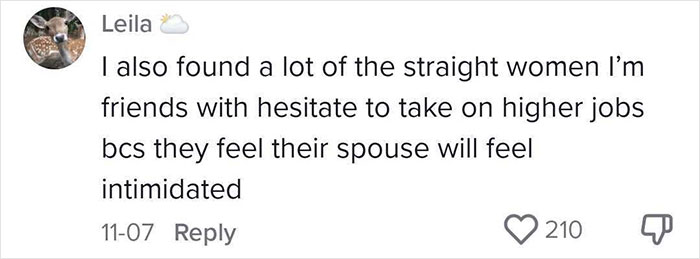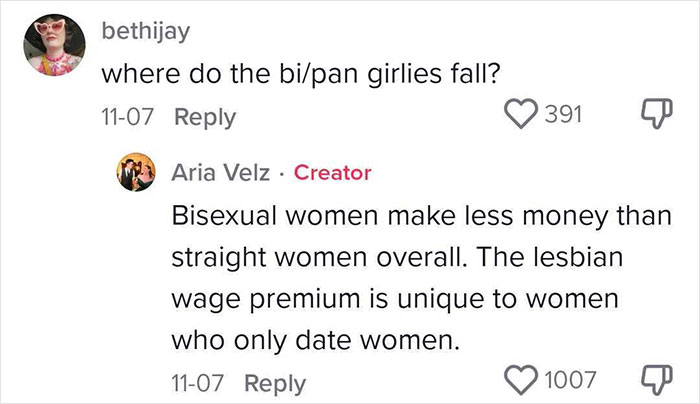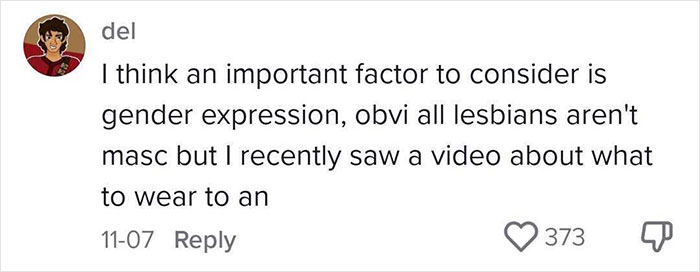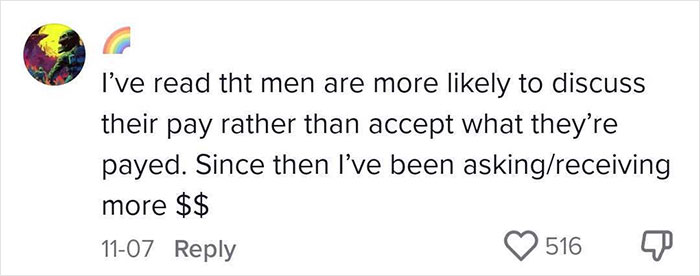In an ideal world, everyone would have the same career opportunities. However, we don’t live in such a world. A person’s gender, sexual orientation, family situation, education, society’s expectations, and the (un)fair distribution of chores at home can all impact their earning power.
Popular TikTok content creator Aria Velz (@ariavelz) recently went viral on the video-sharing platform after tackling the question of the so-called ‘lesbian wage premium.’ It’s the research-backed observation that lesbian women consistently tend to out-earn straight women, especially in the United States. Scroll down for the full story.
Bored Panda has reached out to Velz via email, and we’ll update the article as soon as we hear back from her.
The so-called ‘lesbian wage premium’ is a research-backed phenomenon, where homosexual women tend to earn more than heterosexual women. One TikToker analyzed this

Image credits: ariavelz
“Why do lesbians earn more money than straight women? For years, social scientists have observed that lesbians consistently out-earn straight women. According to a meta-analysis of 30 international studies, gay women earn an average of 9% more than straight women, with variations by country. This has been observed so often that it even has a name, the lesbian wage premium.”

Image credits: Alexander Grey / unsplash (not the actual photo)
“So why is that? Why do lesbians, particularly in the US, out-earn straight women? We can start with the obvious fact that lesbians tend to be more educated than straight women, are less likely to have children, live more predominantly in cities, and have more professional jobs.”

Image credits: MD Duran / unsplash (not the actual photo)
“But even when controlling for all of these factors, the lesbian wage premium is still present. So what else could it be? Well, one hypothesis is that it could have to do with the division of labor among the household. And so to look at that, we also have to look at the gender wage gap a bit. While the gender wage gap has certainly gotten smaller, one of the reasons why the gap still exists is the expectations that women face for domestic and emotional labor that men tend not to have. Generally, in heterosexual couples, the women are more likely to be the primary child rearer and the family caretaker, and they’re more likely to take on the domestic labor responsibilities at home, meaning that women will often have to make the trade-off for advancing their career in order to maintain the house. While men usually just have to focus on their careers.”

Image credits: Ron Lach / pexels (not the actual photo)
“In contrast, lesbian households have more equal domestic labor distributions among the couple than straight households; there is not one partner who tends to oversee domestic responsibilities and one partner who’s able to focus more on work and earn money. Both lesbian partners generally contribute more equally to the household and their careers, meaning that lesbians do not face the same trade-offs that straight women do when it comes to focusing more on their family or their career. And that translates into lesbians being able to earn higher wages.”

Image credits: Ketut Subiyanto / pexels (not the actual photo)
“Interestingly, when you look at the wages of lesbians who have lived with a previous male spouse and lesbians who have never lived with a male spouse, the lesbian wage premium is significantly more present for the lesbians who have never lived with a male spouse. The lesson here is not that lesbians are better at making money; it reconfirms that the domestic labor situation at home contributes to how women earn more outside the home, and lesbians have just learned that lesson first.”
You can watch Velz’s full viral video right over here
@ariavelz♬ original sound – Aria Velz
Velz’s two-minute-long clip was viewed 550k times on TikTok and garnered nearly 95k likes. She also started a discussion about fair pay, asking for a higher wage during job interviews, and the equal distribution of domestic work at home.
A 2015 meta-analysis of 31 studies about the wage gap found that there is evidence of the so-called ‘lesbian wage premium.’ Homosexual women earn, on average, 9% more than heterosexual women.
However, the situation is different for men. The meta-analysis found that gay men earned an average of 11% less than straight men.
Another study, also from 2015, found that the longer a man has self-identified as gay, the larger his wage gap, due to discrimination. However, the sexual orientation wage gap for men has been decreasing over time.
Whether or not an employee is single also impacts their earning capabilities. Other studies have found that married heterosexual men earn more than single men, however, married homosexual men do not. With some exceptions, of course.
Some research indicates that both homosexual and heterosexual men in relationships earn more or less the same, on average. Meanwhile, lesbian women who have partners out-earn straight women.
“The cumulative effect of these results is consistent with the conjecture that the earnings gap is related to the perceived likelihood of becoming a parent,” John Levendis and Aaron Lowen explain in their 2022 study of what same-sex adoption laws can tell us about the gender wage gap in the United States.
According to the researchers, “an increased likelihood of parenthood has an adverse impact on the earnings of women but not of men.”
As the Washington Post puts it, the ‘wife penalty’ is a reality, as straight women tend to take on the lion’s share of the housework and childcare at home. This doesn’t mean, however, that all women dislike being parents: many embrace the calling. On top of that, some households do aim to have an equal distribution of chores.
But the reality is, on average, that mothers who also want to have a career have to overcome additional barriers because they have more responsibilities to shoulder.
As CNN notes, a study conducted by the Pew Research Center found that in heterosexual relationships where both partners earn the same, women still spend more time on housework and childcare.
Meanwhile, their husbands have more free time to spend on leisure and paid work.
Here’s what some members of the TikTok community had to say about the wage gap


















